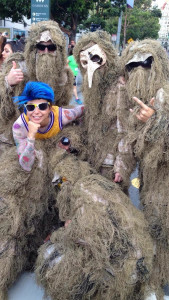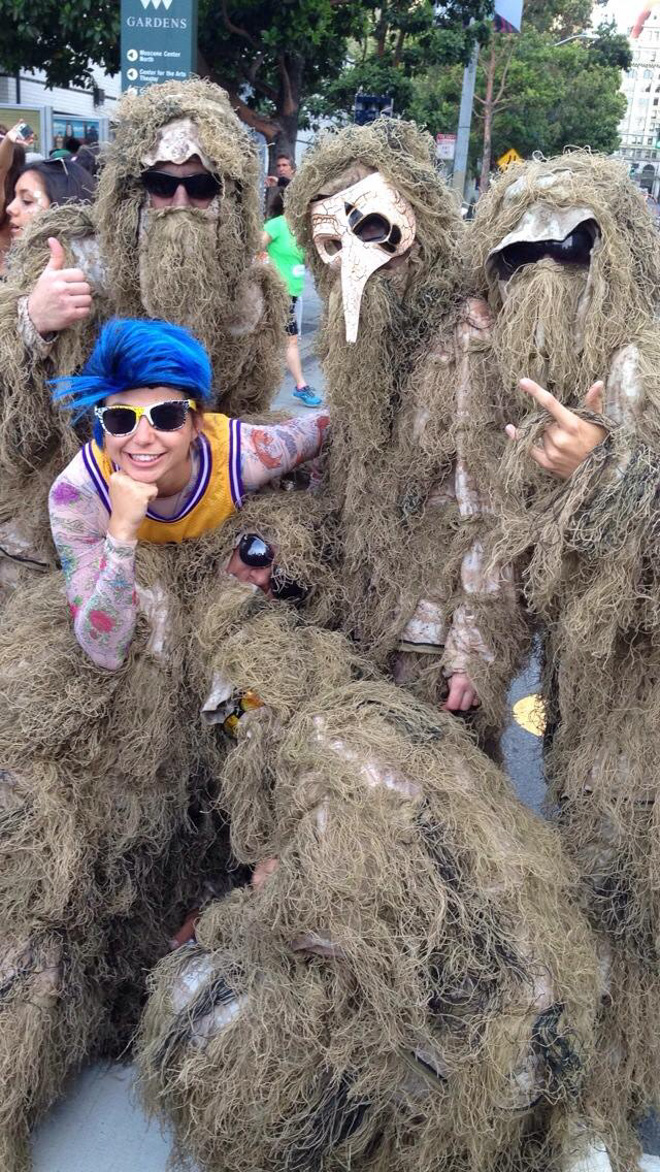Last summer, Stanford women’s lacrosse star Lucy Dikeou did not foresee that she would lead her team in goals and overall points, earn All-American status and be nominated for the Tewaaraton Award, the Heisman trophy of lacrosse.
Instead, she dedicated her time to achieving a goal entirely off of the lacrosse field: launching a startup.

After participating in a coding program in South Africa last summer, Dikeou and one of her classmates from the program, Liana Kadisha, along with a GSB student, Daniel Scott, created a startup that allowed people to rent costumes and rally attire.
The startup, which they named Flair, was initially targeted towards college students, whose schedules are often full of themed parties and events in which the more ridiculous the rally is, the better. Yet students have minimal time to go out and search for costumes and hardly any room to store what they may buy; that’s where Dikeou and her partners stepped in with Flair.
Dikeou’s inspiration did not simply come from a desire to satisfy the needs of college students in Greek life and costume or Halloween enthusiasts.
“My mom is a costume fanatic. You go into her attic and she has probably 50 or 60 boxes of costumes,” Dikeou said. “She has collected them from thrift shops, so growing up, I loved costumes.”
“And then I came to Stanford [and] loved Stanford’s culture around dressing up and finding weird expression through costumes,” she added.
And what better place to start a startup than Stanford, where the resources and entrepreneurial spirit seem endless?
As a product design major, Dikeou has learned in her classes the ways in which a simple idea can be taken to the next level. But her experience with a startup of her own not only taught her more about the intricacies of the costume and rental industries, but also about the complexities of running a successful business.
“I wanted to form a company or try to see what it’s like to see what I want to go into, what skills I still need to learn,” Dikeou said. “That was probably one of the biggest lessons, like, this is all the information I need to learn. There’s so many aspects of startups that I still need to explore.”

Dikeou and her partners had the opportunity to speak with Amazon, the largest Internet-based retailer in the country, to see how the company expanded from selling only books to practically everything, as well as how it handles the difficulties of taking inventory.
“They aren’t a huge company in the world now because they sold books and got really big for it,” Dikeou said. “They have these spectacular skills in inventory, and once they had it, they realized they could apply it to other works of life.”
“When you start a startup, it’s not necessarily the idea but some new insights, some new way of doing something that can drive these new companies, and you just have to be really good at one thing first — and then you can expand from there,” Dikeou added.
Once Dikeou and her partners got situated, they held two events, one of which occurred during Halloween, to try to see what kinds of costumes (in terms of theme and price, for example) people were most likely to rent.
“There are a lot of really high-end costumes, and then there’s a lot of really cheap costumes that all look the same, you’ll see someone else in it guaranteed, and those are the ones people afford and keep buying,” Dikeou said. “It would be cool to have one-of-a-kind, cheaper costumes.”
“We also got some negative feedback from [the event], being like, ‘well, I’m only renting because it’s Halloween — I wouldn’t do this year-round,’ so then that gave us some issues,” she added.
Dikeou and her partners also created an online prototype that they used as a miniature version of what a potential app could look like. In the process, the group came to discover the challenges that their concept and the demands of their potential clients generated.
For one, delivering the costumes would have to be completely executed by Flair itself: In other words, the company would not be like Craigslist or eBay, in which the people using the services have to figure out for themselves how they will obtain materials.
Instead of customers renting costumes from each other, Flair would have to store and distrubute all the garments.
“We asked people to rent them [from each other], but usually they really just don’t have time to go through and inventory their rally boxes,” Dikeou said. “And it’s hard to get someone to go through and inventory all their costumes if they’re not positive they’re going to get money for it or if someone is going to rent it.”
But overseeing the inventory was in of itself a tricky task.
“Managing inventory was really hard, especially if we were planning to scale,” Dikeou said.
But the challenges of running a startup did not only come within the company itself. Dikeou estimates that she spent around 20 hours a week working on the startup — the same amount of hours the NCAA allows athletic teams to practice in season and a pretty hefty time commitment for any Stanford student, let alone a student-athlete.
“I learned how to do really well without sleeping — like barely sleeping,” Dikeou said.
At the end of the day, the demands of the startup and Dikeou’s and Kadisha’s (as Scott had dropped out earlier in the process) other commitments proved to be too much for the time being, leading the duo to put the idea on the backburner.
“We sat down and had a very honest conversation about what we wanted and what we expected,” said Dikeou, “and we realized that continuing wouldn’t necessarily give us what we wanted out of college. So we stopped.”
“It was a little disappointing, but at the same time I had to be realistic about it. I think that if we really wanted to, we could get the idea to work, but we would not be able to while I was a student-athlete and while [Kadisha] was in school. The more I thought about it, I didn’t know if I wanted to dedicate my life to costumes.”
Dikeou’s decision hardly indicated a failure but rather a prioritization of what’s more important than the success of a business: her college experience.
“We realized that so many people at Stanford are so pressured to almost drop out and start something and be incredible, but I think that college itself is such a cool experience. You’ve kind of got to relax — it’s the only time you should have free time in your life. There will be opportunities after college to try something maybe bigger and more legit.”
The experiences with and insights she gained into business will nevertheless serve her well: After gaining some experience with web design this summer and completing her senior year, Dikeou aims to learn more about business management before potentially trying her hand once more in the world of startups.
“The startup process was a lot of me doing my own stuff, and then from there, you have to go back down and learn a lot, so now I’m back to information-gathering, and I think I’ll do that for another four or five years, go through and work for different companies and see what I can learn,” Dikeou said. “Eventually, I think I’ll start another company — when I do go back and try to start this, I know that I’ll have all the skills necessary to do this.”
Next year, her final year on the Farm, Dikeou will continue to make her mark for the lacrosse team, when, following the graduations of Hannah Farr and Rachel Ozer, the pressure will be on her to lead the team to another successful season.
“You realize so much throughout Stanford that your team is your priority, and it has to be, because that’s how you do well as a team and bond,” Dikeou said.
Yet when she’s not tearing it up on the field, you may likely find her donning the occasional neon blue wig or era-specific outfit. And after Flair shut down shop, she was the one to take all of the costumes.
“Right now I think I have 12 rally boxes,” Dikeou said. “My roommate’s got to hate me.”
Contact Alexa Philippou at aphil723 ‘at’ stanford.edu.
